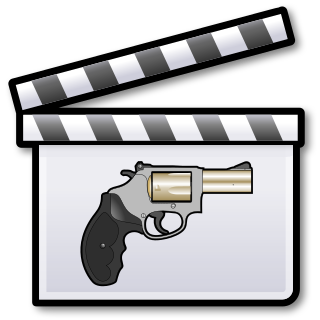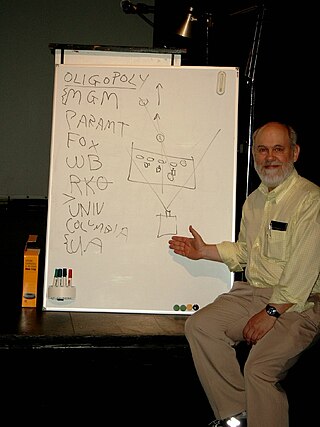Related Research Articles

A narrative,story,or tale is any account of a series of related events or experiences,whether non-fictional or fictional. Narratives can be presented through a sequence of written or spoken words,through still or moving images,or through any combination of these. The word derives from the Latin verb narrare,which is derived from the adjective gnarus. The formal and literary process of constructing a narrative—narration—is one of the four traditional rhetorical modes of discourse,along with argumentation,description,and exposition. This is a somewhat distinct usage from narration in the narrower sense of a commentary used to convey a story. Many additional narrative techniques,particularly literary ones,are used to build and enhance any given story.

Crime films,in the broadest sense,is a film genre inspired by and analogous to the crime fiction literary genre. Films of this genre generally involve various aspects of crime and its detection. Stylistically,the genre may overlap and combine with many other genres,such as drama or gangster film,but also include comedy,and,in turn,is divided into many sub-genres,such as mystery,suspense or noir.

Oral literature,orature,or folk literature is a genre of literature that is spoken or sung as opposed to that which is written,though much oral literature has been transcribed. There is no standard definition,as anthropologists have used varying descriptions for oral literature or folk literature. A broad conceptualization refers to it as literature characterized by oral transmission and the absence of any fixed form. It includes the stories,legends,and history passed through generations in a spoken form.
Narratology is the study of narrative and narrative structure and the ways that these affect human perception. The term is an anglicisation of French narratologie,coined by Tzvetan Todorov. Its theoretical lineage is traceable to Aristotle (Poetics) but modern narratology is agreed to have begun with the Russian formalists,particularly Vladimir Propp,and Mikhail Bakhtin's theories of heteroglossia,dialogism,and the chronotope first presented in The Dialogic Imagination (1975).
Jack David Zipes is a literary scholar and author. He is a Professor Emeritus in the Department of German,Nordic,Slavic and Dutch at the University of Minnesota.
Jonathan Culler is an American literary critic. He was Class of 1916 Professor of English and Comparative Literature at Cornell University. His published works are in the fields of structuralism,literary theory and literary criticism.
Television studies is an academic discipline that deals with critical approaches to television. Usually,it is distinguished from mass communication research,which tends to approach the topic from a social sciences perspective. Defining the field is problematic;some institutions and syllabuses do not distinguish it from media studies or classify it as a subfield of popular culture studies.
Ecocriticism is the study of literature and ecology from an interdisciplinary point of view,where literature scholars analyze texts that illustrate environmental concerns and examine the various ways literature treats the subject of nature. It was first originated by Joseph Meeker as an idea called "literary ecology" in his The Comedy of Survival:Studies in Literary Ecology (1972).

David Jay Bordwell was an American film theorist and film historian. After receiving his PhD from the University of Iowa in 1973,he wrote more than fifteen volumes on the subject of cinema including Narration in the Fiction Film (1985),Ozu and the Poetics of Cinema (1988),Making Meaning (1989),and On the History of Film Style (1997).
Frederick Luis Aldama is an American author,editor,and academic. He is the Jacob &Frances Sanger Mossiker Chair in the Humanities and founder and director of the Latinx Pop Lab at the University of Texas,Austin. At UT Austin is also affiliate faculty in Latino Media Arts &Studies and LGBTQ Studies. He continues to hold the title Distinguished University Professor as adjunct professor at The Ohio State University. He teaches courses on Latinx pop culture,especially focused on the areas of comics,TV,film,animation,and video games in the departments of English and Radio-Television-Film at UT Austin. At the Ohio State University he was Distinguished University Professor,Arts &Humanities Distinguished Professor of English,University Distinguished Scholar,and Alumni Distinguished Teacher as well as recipient of the Rodica C. Botoman Award for Distinguished Teaching and Mentoring and the Susan M. Hartmann Mentoring and Leadership Award. He was also founder and director of the award-winning LASER/Latinx Space for Enrichment Research and founder and co-director of the Humanities &Cognitive Sciences High School Summer Institute. In has been inducted into the National Academy of Teachers,National Cartoonist Society,the Texas Institute of Letters,the Ohio State University's Office of Diversity &Inclusion Hall of Fame,and as board of directors for The Academy of American Poets. He sits on the boards for American Library Association Graphic Novel and Comics Round Table,BreakBread Literacy Project,and Ad Astra Media. He is founder and director of UT Austin's BIPOC POP:Comics,Gaming &Animation Arts Expo &Symposium as well as Founder and Editor-in-Chief of the Latinx Pop Magazine.
Leo Braudy is University Professor and Professor of English at the University of Southern California,where he teaches 17th- and 18th-century English literature,film history and criticism,and American culture. He has previously taught at Yale,Columbia,and Johns Hopkins University. He is best known for his cultural studies scholarship on celebrity,masculinity,and film,and is frequently sought after for interviews on popular culture,Hollywood cinema,and the American zeitgeist of the 1950s.
Quality television is a term used by television scholars,television critics,and broadcasting advocacy groups to describe a genre or style of television programming that they argue is of higher quality due to its subject matter,style,or content. For several decades after World War II,television that was deemed to be "quality television" was mostly associated with government-funded public television networks;however,with the development of cable TV network specialty channels in the 1980s and 1990s,US cable channels such as HBO made a number of television shows during the turn of the century that some television critics argued were "quality television",such as Angels in America,Sex and the City,The Sopranos,The Wire and Six Feet Under.
Toby Miller is a British/Australian-American cultural studies and media studies scholar. He is the author of several books and articles. He was chair of the Department of Media &Cultural Studies at the University of California,Riverside (UCR) and is most recently a professor at Loughborough University. Prior to his academic career,Miller worked in broadcasting,banking,and civil service.

Jay Clayton is an American literary critic who is known for his work on the relationship between nineteenth-century culture and postmodernism. He has published influential works on Romanticism and the novel,Neo-Victorian literature,steampunk,hypertext fiction,online games,contemporary American fiction,technology in literature,and genetics in literature and film. He is the William R. Kenan,Jr. Professor of English and Director of the Curb Center for Art,Enterprise,and Public Policy at Vanderbilt University.

The Department of Radio–Television–Film at the University of Texas at Austin located in Austin,Texas,is one of the five departments comprising the Moody College of Communication. The department was founded in 1965 and has become one of the nation's premiere film schools,consistently ranking in the top 5 for graduate programs and the top 10 for undergraduate studies. The department has a very selective admissions policy,accepting fewer than 25% of applicants in its undergraduate program,and fewer than 15% of applicants in its graduate programs.
Robert D. Newman is an American literary scholar,poet,and the current president and director of the National Humanities Center. From 2001 to 2015 he served as dean of the College of Humanities,Associate Vice President for Interdisciplinary Studies,and professor of English at the University of Utah where he was widely recognized for his efforts to increase support for the college,expand its program offerings,and in support of greater campus diversity.
E. Ann Kaplan is an American professor,author,and director. She currently teaches English at the Stony Brook State University of New York,and is the founder and director of The Humanities Institute at Stony Brook University. She coined the term "“Future-Tense Trauma Cinema”for a select group of films,a sub-set of the Science Fiction film,that focus on human and natural causes of complete social collapse instead of,as in standard Sci-Fi,displacing cultural anxieties into allegories of aliens invading planet Earth from elsewhere."" She is also one of the precursors of the Madonna studies.
A video essay is an essay presented in the format of a video recording or short film rather than a conventional piece of writing;The form often overlaps with other forms of video entertainment on online platforms such as YouTube. A video essay allows an author to directly quote from film,video games,music,or other digital mediums,which is impossible with traditional writing. While many video essays are intended for entertainment,they can also have an academic or political purpose. This type of content is often described as educational entertainment.

Ruth Hardy is an American political figure from East Middlebury,Vermont. A Democrat,she was elected to the Vermont Senate in 2018.
Caroline Levine is an American literary critic. She is the David and Kathleen Ryan Professor of Humanities at Cornell University. Her published works are in the fields of Victorian literature,literary theory,literary criticism,formalism,television,and climate change.
References
- ↑ "Jason Mittell - Georg-August-Universität Göttingen".
- 1 2 Mittell, Jason (2004). Genre and Television: From Cop Shows to Cartoons in American Culture . Routledge. pp. 238. ISBN 978-0-415-96903-1 . Retrieved 2009-05-05.
- 1 2 Mittell, Jason (February 2009). Television and American Culture. Oxford University Press. p. 320. ISBN 978-0-19-530667-5 . Retrieved 2009-05-05.
- 1 2 Mittell, Jason (2017). Narrative theory and Adaptation. Film theory in practice. New York: Bloomsbury. ISBN 978-1-5013-0838-3.
- ↑ Thompson, Ethan; Mittell, Jason, eds. (2020). How to Watch Television (Second ed.). New York: New York University Press. ISBN 978-1-4798-9063-7.
- ↑ "The Videographic Essay". The Videographic Essay: Practice and Pedagogy. Retrieved 2024-06-03.
- ↑ "Scholarship in Sound & Image". The National Endowment for the Humanities. 2017-12-01. Retrieved 2024-06-03.
- ↑ "Scholarship in Sound & Image". Middlebury College. Retrieved 2024-06-03.
- ↑ Jason Mittell (2015) Complex TV: The Poetics of Contemporary Television Storytelling. New York: New York University Press, p. 43.
- ↑ Sarah Kozloff (2016) review of Complex TV: The Poetics of Contemporary Television Storytelling.Cinema Journal Volume 55, Number 3 (Spring 2016): 159
- ↑ Sarah Kozloff (2016) review of Complex TV: The Poetics of Contemporary Television Storytelling.Cinema Journal Volume 55, Number 3 (Spring 2016): 159-160
- ↑ "Grodal". Archived from the original on 2016-09-18. Retrieved 2016-05-05.
- ↑ Jason Mittell (2015) Complex TV: The Poetics of Contemporary Television Storytelling. New York: New York University Press, p. 205.
- ↑ Cohen, Noam (February 21, 2007). "A History Department Bans Citing Wikipedia as a Research Source". The New York Times. Retrieved 2009-04-29.
- ↑ "Mittell's homepage". Archived from the original on 2007-07-04. Retrieved 2007-04-16.